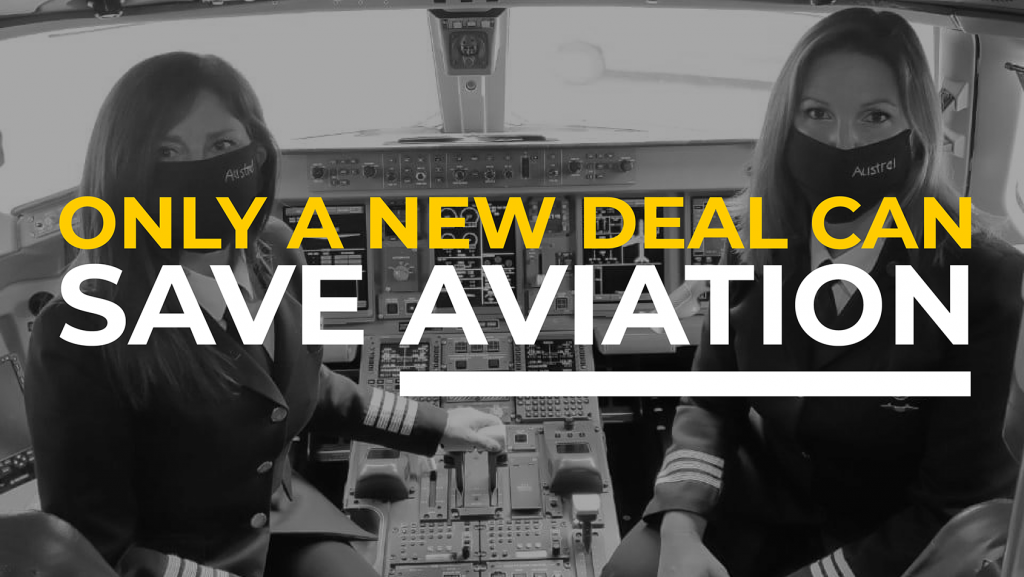 The aviation industry is being hit by a second wave, and we are already experiencing the aftershocks with thousands of job losses throughout the industry. The ITF is urgently calling for a new deal for aviation workers based on relief, recovery and reform.
The aviation industry is being hit by a second wave, and we are already experiencing the aftershocks with thousands of job losses throughout the industry. The ITF is urgently calling for a new deal for aviation workers based on relief, recovery and reform.
At the outset of the Covid-19 pandemic we set out our 10 key demands for governments and employers, and an ITF survey of affiliates has shown that a majority of our affiliates have achieved many of these for their members, but often only for a temporary period of time. Now the full economic impact of Covid-19 is being felt, many of the initial support mechanisms provided to save jobs, support workers and safeguard the industry are starting to dry up leaving the industry in a desperate fight for survival. We again call on governments and employers to adopt our key demands.
All parties need to help the industry recover. This must include workers, employers, regulators and states.
Workforce impact
In this case, the second wave is not Covid-19 but the threat to the employment of hundreds of thousands of workers throughout the global aviation industry. Almost every day another announcement hits the headlines somewhere about an airline laying off workers or facing financial disaster.
At a time when aviation is playing such a critical role in helping us all against the worse effects of the pandemic it is hard to take. Our affiliates, and your members, have stepped up and done their bit to support us all, now we need to repay them by doing the same.
Saving aviation, and all of the jobs and communities so heavily reliant on air travel will not be a quick fix; the industry needs major reform in order to be sustainable in the long-term.
But first we must focus on immediate relief to stop the loss of highly skilled workers critical to maintaining the infrastructure needed for the industry to bounce back. The potential footprint of job losses goes way beyond just aviation itself, with aerospace and tourism jobs highly reliant on the sector as well.
If we want passenger confidence to return, it is also vitally important that workers in the sector feel safe; that’s why ITF have set out clear conditions for a safe return to the skies.
Conditional financial support
Governments need to extend schemes that were put in place at the beginning of the crisis in order to allow the sector to bounce back. Corporate financial relief must also be conditional on long-term reform.
Developing national task forces that include all stakeholders as equal partners is a good starting point. Ensuring that vital workers are not the casualties of the crisis must be the priority, with the protection of jobs and terms and conditions as central pillars of financial relief packages. Workers must also be put before profit, and any benefits lost by workers must be restored before shareholder payouts or CEO pay increases when airlines transition back to profit.
The industry must also receive access to conditional financial support that encourages fleet renewal including the scrapping of older aircraft to be replaced by newer, cleaner and more efficient models. Reducing the environmental footprint of the aviation industry is a goal shared by all of the major stakeholders and achievable with the right foresight and planning.
Aviation ecosystem
It is vital that the aviation ecosystem is fit for purpose if the industry is to bounce back. The safety of airports and infrastructure will be critical in growing passenger confidence moving forward.
The coronavirus pandemic has served to highlight the pit falls of deregulation and privatisation in airports with many governments considering renationalisation or similar in order to protect passengers, jobs, the ability to travel and maintain essential supply chains.
Building the new infrastructure that is required to support the transition to a more environmentally friendly industry will need major long-term capital expenditure. These newer, or rebuilt, airports will be a vital component in reducing the risk of future pandemics to passengers as the latest knowledge and experiences can be integrated into the design. Workers’ capital will have a major role to play in the development of these projects.
Systems integration
As Covid-19 has impacted on our industry, ITF has been seeking out strategic partners who also share a desire to campaign to save our industry and ensure a safe return for workers and passengers alike. The foundations for a successful return of the industry must be built on a solid base and the recognition that without a highly skilled workforce the industry will not recover.
We will continue to build relationships and work with those organisations willing to commit to our vision of a new deal for aviation based on relief, recovery and reform.
Tags: COVID-19, deregulation, New Deal, protecting jobs, recovery, reform, system integration

